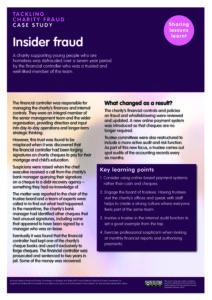Insider fraud
A charity supporting young people who are homeless was defrauded over a seven-year period by the financial controller who was a trusted and well-liked member of the team.
The financial controller was responsible for managing the charity’s finances and internal controls. They were an integral member of the senior management team and the wider organisation, providing direction and input into day-to-day operations and longer-term strategic thinking.
However, this trust was found to be misplaced when it was discovered that the financial controller had been forging signatures on charity cheques to pay for their mortgage and child’s education.
Suspicions were raised when the chief executive received a call from the charity’s bank manager querying their signature on a cheque to a debt recovery agency – something they had no knowledge of.
The matter was reported to the chair of the trustee board and a team of experts were called in to find out what had happened. In the meantime, the charity’s bank manager had identified other cheques that had unusual signatures, including some that appeared to have been signed by a manager who was on leave.
Eventually it was found that the financial controller had kept one of the charity’s cheque books and used it exclusively to forge cheques. The financial controller was prosecuted and sentenced to two years in jail. Some of the money was recovered.
What changed as a result?
The charity’s financial controls and policies on fraud and whistleblowing were reviewed and updated. A new online payment system was introduced so that cheques are no longer required.
Trustee committees were also restructured to include a more active audit and risk function. As part of this new focus, a trustee carries out spot audits of the accounting records every six months.
Key learning points
- Consider using online-based payment systems rather than cash and cheques.
- Engage the board of trustees. Having trustees visit the charity’s offices and speak with staff helps to create a strong culture where everyone feels part of the same team.
- Involve a trustee in the internal audit function to set a good example from the top.
- Exercise professional scepticism when looking at monthly financial reports and authorising payments.
Download
Category Case studies
